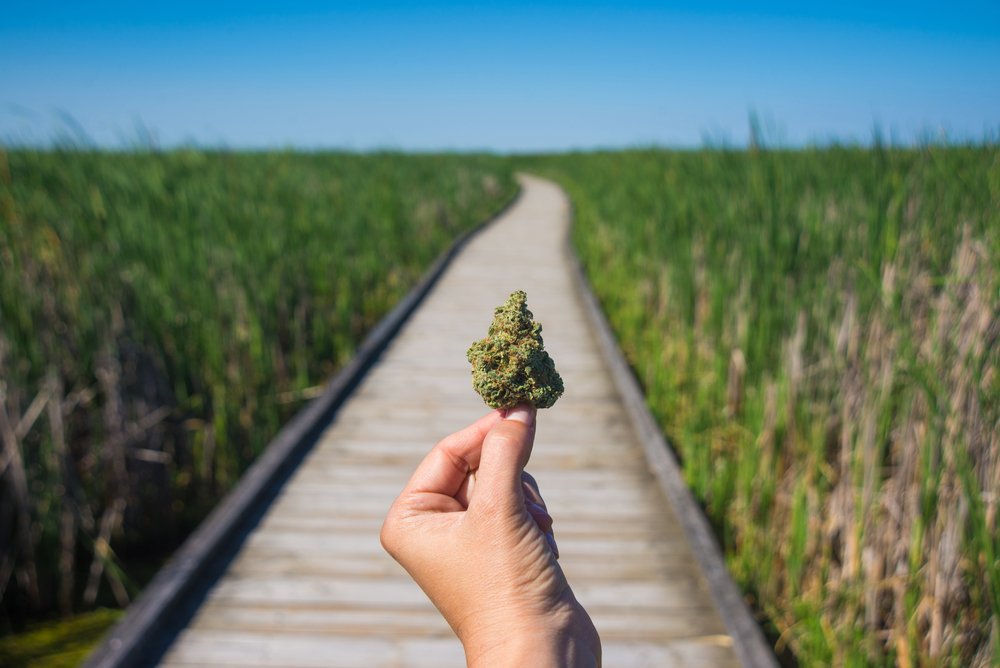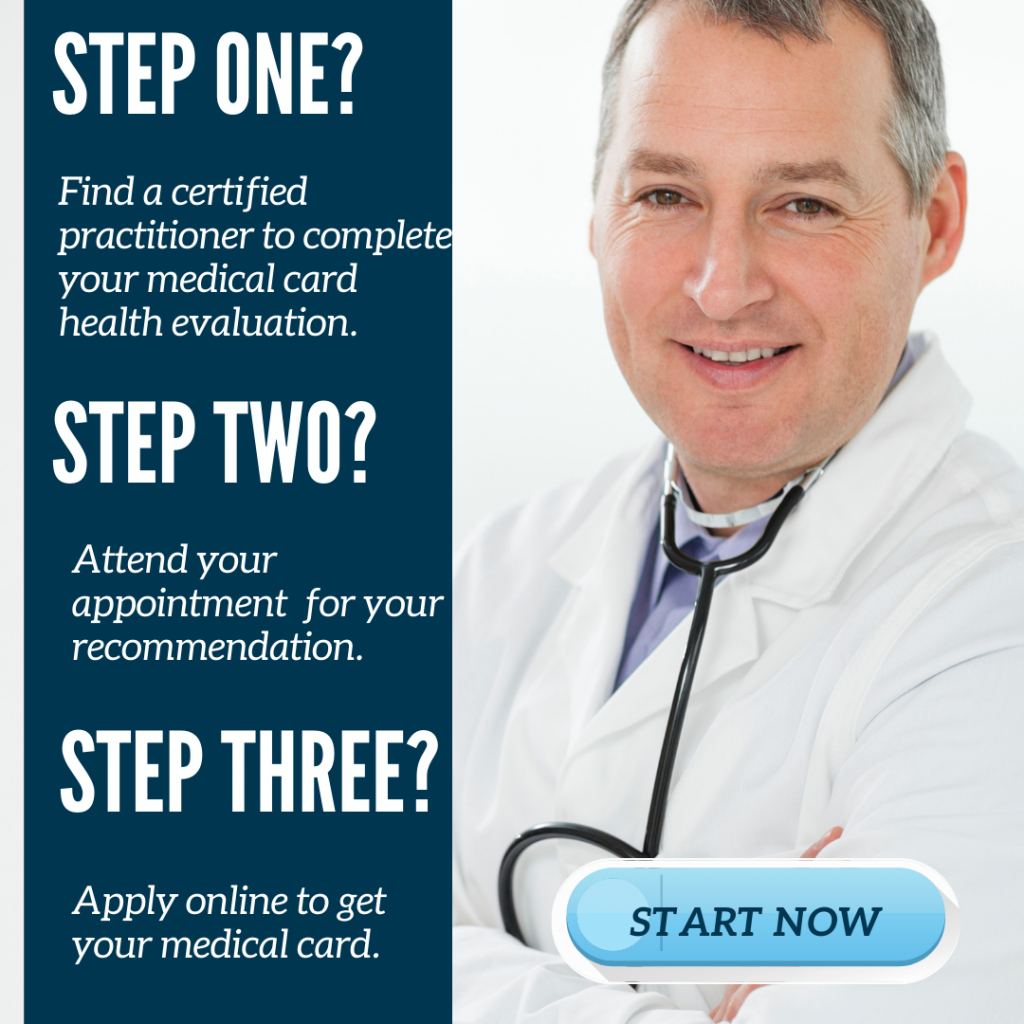
Your state legalized medical cannabis. And you have been reading about how cannabis might help you manage your chronic pain, nausea, muscle spasms, anxiety, or depression better? Our bodies have built-in cannabinoid receptors. And having a medical card has made a big difference in the quality of life for patients around the world.
Read: “8 Reasons to Keep Your Medical Card When Your State Legalizes Recreational”
How complicated is it to get your medical card? It’s true; there are a few steps. But if you prepare your documents ahead of time and follow our guide, you should easily apply for your medical card.
Your state has legalized medical marijuana. But that doesn’t mean you are automatically qualified to get a medical card and visit a dispensary. There are certain qualifications that patients have to meet before they can get a medical card. And the first step is determining if you have a qualifying health condition.
Each state with a medical card program provided a list of symptoms and diagnosed health conditions. If you have been diagnosed with one (or more) conditions on the qualifying list, you can apply for your medical card.
MarijuanaDoctors.com makes it easy to find all the information you need, including an updated list of qualifying health conditions in your state. Click here to find your state and see if you have a diagnosis that will allow you to apply for your medical card.
Many states require that you provide an updated or recent diagnosis of your health condition. Suppose you had your formal diagnosis a long time ago. In that case, you will want to have your primary care physician (PCP) do an examination, and update their diagnosis of your condition and symptoms.
A simple visit to your doctor’s office can help your medical card application go through without additional delays. You can choose to tell your PCP that you are applying for your medical card. It is recommended so that they can add that information to your medical file. It can help with future treatment and prognosis.
However, you don’t have to disclose that information to your physician if you feel uncomfortable about it. You can develop a treatment plan and follow-up appointments with the marijuana doctor that performs your health evaluation and medical card referral.
You will need at least one government-issued photo identification for your medical card application. Some states have unique state ID cards, but a passport or driver’s license is also accepted as long as the ID is current and not expired.
Before you schedule your appointment for your medical card health evaluation, make sure your identification is good to go. And if not, go ahead and renew your photo ID and schedule your appointment when you receive your new card.
In some states, only a physician that has completed special training and is state-certified can perform the evaluation. But in the majority of states, any board-certified physician registered to practice medicine in that state, can complete the medical card patient evaluation.
Some states require that a physician has a ‘prior relationship’ with the patient before recommending them for a medical card. What this means is that you will need at least two (2) appointments with the doctor. The first appointment will allow the physician to discuss your health problems and symptoms and review your health history. The second appointment you schedule will be to review whether medical marijuana is a safe therapeutic choice for you.
When you are looking for a doctor for your medical card health evaluation, you will be able to tell if a prior appointment is required. The fee will include two (2) appointments. In some states, a follow-up appointment is also required. After you have received your medical card, it is sometimes scheduled for three (3) months after you have started using medical marijuana.
At the time you book your appointment with the doctor, you will be told about the required number of appointments. The physician or practitioner will let you know what is required by law.
No time to go looking for a medical card doctor? Click below and fill out the form, and we’ll have the provider email or call you to schedule your health evaluation.

Some physicians will ask you to submit your health records before your appointment. This is a really good way to make your health evaluation go smoothly. And to give the doctor all the information they need to do the medical card health check.
Providing records is easy. Simply contact your primary care provider (PCP) and ask for a copy of your health records for at least 1-2 years. Ask for a digital copy (.PDF) so that you can attach them in an email or print and fax them to the evaluating doctor before your appointment.
Inside your health records should be informed about your current prescription medications, health history, lifestyle wellness information (smoking, alcohol consumption, and weight). It is also a good idea to include some notes about your family history. This will help the physician who evaluates you for your medical card.
Your appointment may be scheduled in-office, with the provider near you. Or in some cases, the medical card health evaluation can be completed online. Where telemedicine evaluations are allowed by law, doctors will send you an email to let you know the day and time of your appointment. They will also provide a URL (website link) that you will need to click to get into the private online conference with the doctor.
If you have scheduled an appointment with telemedicine, you will need a smartphone, tablet, laptop, or computer to participate. And you must have a good internet connection. You will not need to download software (in the majority of cases) to attend your telemedicine appointment.
Make sure you don’t miss your appointment! Many patients apply for medical cards, and missing an appointment means you will have to be rescheduled for a later date. Remember, if your medical card is approved, it can take up to 4-6 weeks in some cases to get your state-issued card.
Most states require that the patient completes the application and registration process. If you have been approved for a medical card from a provider, you will be given a signed letter. This letter states that the doctor has reviewed your health history, symptoms and diagnoses, and feels that cannabis poses no significant risk to your health.
The physician that completed your evaluation will guide you to the next step. They will provide a link to the state medical marijuana program website. That’s where you will complete your application to become a registered patient.
A payment method is for the registration fee. The average cost of registering is about $50 but varies by state. And you will be required to pay an annual renewal fee to remain registered in your statewide medical marijuana program.
If you are receiving Medicare or Medicaid benefits or a veteran, you may be entitled to a discount. Ask the physician for more information.
The time it takes the state medical cannabis program to respond varies significantly. In some states, approval happens the same day. And patients can download and print a temporary medical card and visit a dispensary right away.
Each application is very carefully reviewed in other states before deciding whether to accept the patient into the program. And they also check with the physician to determine if the doctor is board-certified and legally permitted to make the referral. In these states, there is no temporary card. Patients will wait anywhere from 15 to 30 days to receive their card in the mail (or electronically).
You got the email from the state medical marijuana program that you were approved. You will still get a hard copy of your medical card (with your photo on it) in the mail. But that can take time. And the medical marijuana authority in your state knows you have a medical need, so they try not to keep you waiting.
If you receive a link to print your temporary card, click it, and then print off your card. Save that link in case you lose your paper copy before your permanent card arrives in the mail. Now you are ready to find and visit a medical cannabis dispensary with your new medical card!

Searching for different dispensaries in your local area is easy online. In most cases, you will be able to see pictures of the dispensary, too, so that you will feel comfortable when you walk in. Unlike adult-use or recreational cannabis retailers, a medical marijuana dispensary feels more like a clinic. That is because it is designed for patients with health problems.
The first time you visit a medical marijuana dispensary, you will have to set up your patient profile. State laws require that dispensaries keep information about how much cannabis they sell to each patient. That’s because each state has a limit as to how much cannabis you can buy every month. Or, in some cases, a maximum amount of cannabis products you can legally possess.
To set up your patient profile with the dispensary, you will need to bring your permanent or temporary medical card. You will also need to provide another kind of government-issued photo identification. That can be a state ID card, a driver’s license, or a passport.
Remember, your identification must be valid and not expired, so check the date on your cards. Dispensaries will not accept expired medical cards or photo identification. Make sure your identification is valid before you apply for your medical card. And do not let it expire, or you will not be able to purchase from your local dispensary. You will always need another form of photo identification in addition to your medical marijuana card.
Part of setting up your patient profile at a dispensary is providing some information about your symptoms. This helps budtenders to make suggestions based on their wellness goals. If you have chronic pain or neuropathy, for example, there are strains of cannabis that can offer anti-inflammatory benefits and pain relief. Some types of cannabis are good for nausea, while others can be helpful for symptoms of anxiety or depression.
The information you provide the dispensary about your health concerns is confidential. It is not shared and it is secure. If your symptoms or health conditions change, be sure to update your dispensary. A good way to help them tailor suggestions that can help you manage your symptoms better.
In some states, you have to declare one dispensary. And you are only allowed to purchase from that location. However, most states give patients the freedom to visit any medical marijuana dispensary they choose. And sometimes, the price of cannabis products is the only factor that patients consider, when choosing where to buy their medical marijuana.
It really depends on how much personal care you need and want, when you visit a dispensary. For example, when you see the same doctor, there is a benefit. The physician gets to know you and understands your diagnoses and your symptoms. That helps the doctor to give you, the patient, better care.
You don’t have to limit yourself to one dispensary, but it can help you get better service. And you may have to try a few different dispensaries when you are getting started. If you find one you like, with great service and knowledgeable, caring budtenders? They are a keeper! It feels really good to have that kind of relationship with a medical dispensary, that makes every visit a pleasant and personalized experience.
Featured Image: Deposit Photos
No Information on MarijuanaDoctors.Com should be used to diagnose, treat, prevent or cure any disease or condition. You can view our Full Disclaimer here.